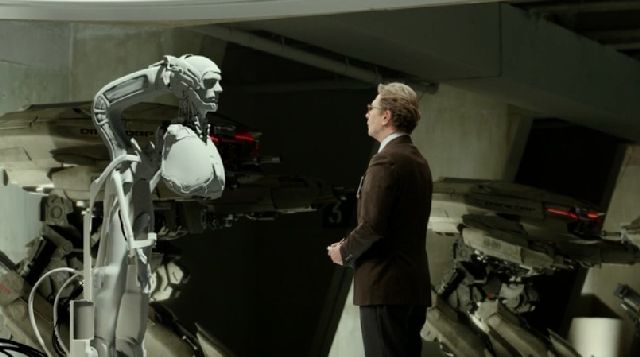Robocop (2014) 
“We’ve got the future under control.”

Director: José Padilha
Cast: Joel Kinnaman, Gary Oldman, Michael Keaton
Synopsis: In 2028 Detroit, when Alex Murphy – a loving husband, father and good cop – is critically injured in the line of duty, the multinational conglomerate OmniCorp sees their chance for a part-man, part-robot police officer.
It’s 2028, and America is still embroiled in manoeuvres in the Middle East, although its chief instruments of peace enforcement are giant robotic drones capable of analysing each shifty-looking local it comes across in order to determine whether they are a threat to security. Raymond Sellars (Michael Keaton), the head of Omnicorp, the company that manufactures these drones, is keen to take the technology used to its next logical level by fusing man and machine into a unit suitable for law enforcement on the streets of America. The problem Sellars has is that the use of robots in the homeland is currently illegal. He pushes on regardless, endeavouring to swing public opinion his way while searching for a suitable candidate to become his first Robocop.
That candidate presents himself in the shattered form of police officer Alex Murphy (Joel Kinnaman — The Darkest Hour, The Girl With the Dragon Tattoo) who is left severely maimed and close to death by a car bomb planted on the instructions of crime lord Antoine Vallon (Patrick Garrow). Sellars enlists the services of Dr Dennett Norton (Gary Oldman — Leon, The Dark Knight) to obtain the permission of Murphy‘s wife, Clara (Abbie Cornish) and manage the complex physiological and psychological procedures necessary to ensure Murphy’s transformation from man to semi-machine goes as smoothly as possible, but the science employed by Norton is incapable of calculating the strength of human emotions, and he finds himself having to go to increasingly unethical lengths in order to keep Murphy compliant with Sellars’ wishes.
Robocop’s focus on the moral and ethical conundrums raised by Murphy’s transformation into a machine (only his head and respiratory system remain intact) means that it ends up as nothing more than a high-tech version of the Frankenstein story. Norton’s mad doctor role might be tempered by a last-minute return to his senses, but the depth of his hubris is indicated by the way that Sellars, the real villain of the piece, who seems to grow more lizard-like as the film unfolds, merely has to stroke the doctor’s ego each time he wants him to step over yet another ethical line.
While Jose Padilha’s version of Robocop cursorily acknowledges its origins in the 1987 blockbuster from Paul Verhoeven with an opening snatch of the original movie’s theme tune and a couple of throwaway lines, it turns away from the satirical elements that, together with its cartoonish violence, made Verhoeven’s movie so memorable. Whether that was a smart move is debatable — there’s certainly no getting away from the fact that the 2014 Robocop simply isn’t as much fun as the 1987 version. By exploring the ‘illusion of free will’ strand of the story at the expense of most other aspects it attempts a level of gravitas that the screenplay is incapable of sustaining, and runs the risk of exposing itself as something of a fraud. The fact that the producers opted for a 12A certificate not only diluted the visceral qualities of the story, but also distanced itself even further from the original, and the decision to replace the ads that worked so well in the original with a Devil’s Advocate TV personality (Samuel L. Jackson — Pulp Fiction, Oldboy) is a major misfire that simply doesn’t work.
(Reviewed 17th October 2014)
httpv://www.youtube.com/watch?v=UuVphAuRo7Q
